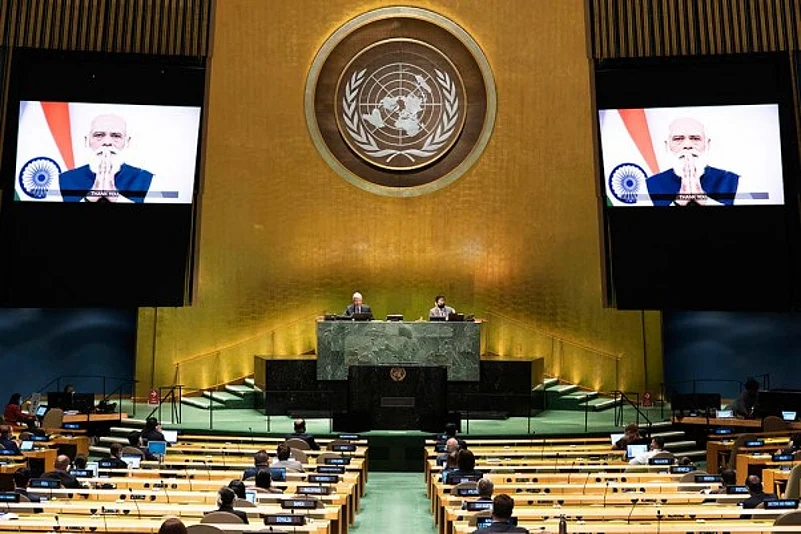A handful of countries are using the Inter-Governmental Negotiations (IGN) as a “smoke-screen” and stopping progress on reforming the Security Council, which has become “impaired”, India has said, asserting that it is time for a “decisive movement” to achieve the long-delayed reform of the powerful UN body.
India’s Permanent Representative to the UN, Ambassador T.S. Tirumurti, speaking in the UN General Assembly on ‘Question of equitable representation on and increase in the membership of the Security Council’, lamented that nothing has moved for more than a decade in the IGN except hearing passionate statements on the need for reform.
“Today’s Security Council is an impaired organ. It has been unable to act with credibility essentially due to its unrepresentative nature. But then, what is happening inside the IGN process, which we seem to be wedded to?” Tirumurti said on Monday.
Criticising the absence of even a single negotiating text, Tirumurti said that the IGN has become like a “platform for debate in a University rather than a serious result-oriented process in the United Nations consisting of sovereign member states”.
“And why have we come to this pass? because just a handful of countries don’t want us to proceed. They have stopped the IGN from progressing. They are using the IGN as a smoke-screen to stop themselves from being identified by paying lip-service to Security Council reform.
“The conditions they are laying out are impossible to fulfill – which is a full consensus of all member states. Ironically, this is happening at a time when we were in a tearing hurry last week to give ourselves e-voting rights. But for IGN, they want no voting, leave alone e-voting, but only full consensus!” he said.
Asserting that there is a need for a decisive movement this year in the UNSC reform process, Tirumurti said: “Without decisive movement, I feel that those who support real reform and who wish to deliver on the commitment made by our leaders, will be forced to look beyond the IGN, maybe to this very Assembly, for results. If that happens, we must not hesitate in taking a relook at the IGN process itself.”
He said since there has been no progress for a decade, the IGN has not only been informal but has no rules of procedure or records, forcing nations to keep their own notes and placing a tremendous burden on all small and medium states.
“The same countries who shed crocodile tears for small and medium states are the same ones denying them even the basic courtesy, which is to help them keep an official record of discussions. What happens here has no record and we start again the next year as if nothing has happened,” Tirumurti said.
India will join the UN Security Council as a non-permanent member for a two-year term beginning January 1, 2021.
India has been at the forefront of the years-long efforts to reform the UN Security Council, saying it rightly deserves a place as a permanent member of the Council, which in its current form does not represent the geo-political realities of the 21st century.
The Indian ambassador stressed that by the time the 75th session of the General Assembly ends in September next year, progress must be made in ensuring the General Assembly Rules of Procedures apply to the IGN to bring about an open, inclusive and transparent process.
“We call for text-based negotiations to start. A text reflecting all positions and proposals from member states will be necessary to make progress,” he said.
Tirumurti said that firm support must be reaffirmed for the Common African Position, as specified in the Ezulwini Consensus and Sirte Declaration.
In the last Summit of the Non-Aligned Movement (NAM), as many as 120 NAM leaders, for the first time, added their voice of support to the Common African Position, he said.
“Let us not sidetrack this discussion by asking for a greater representation only for Africa, but we need to ask for a greater representation for all those who deserve to be in the Security Council, including Africa, Latin America, and others. For all this, we need a serious and credible process,” he said.
On the issues of substance, Tirumurti said that the vast majority of member states are, like India, in favour of expansion in both - permanent and non-permanent - categories of membership of the Security Council.
Noting that the last IGN session was cut short unexpectedly due to the onset of the Covid-19 pandemic, he hoped that in the current UNGA session, the “excuse" of the pandemic is not used to stall the IGN again by insisting on in-person meetings only even as other UN bodies and processes managed to adapt to the changed scenario and continued their deliberations using innovative formats.


























